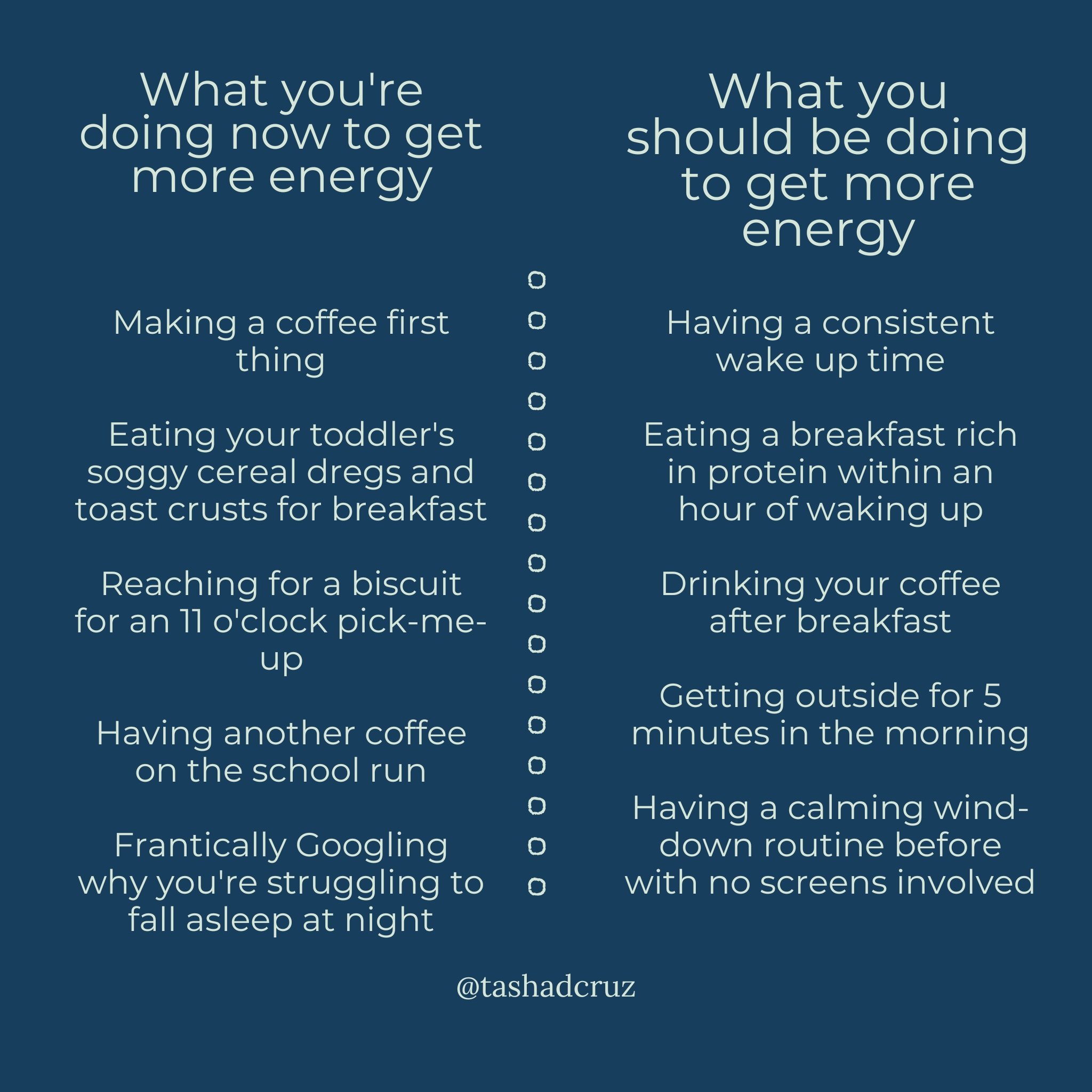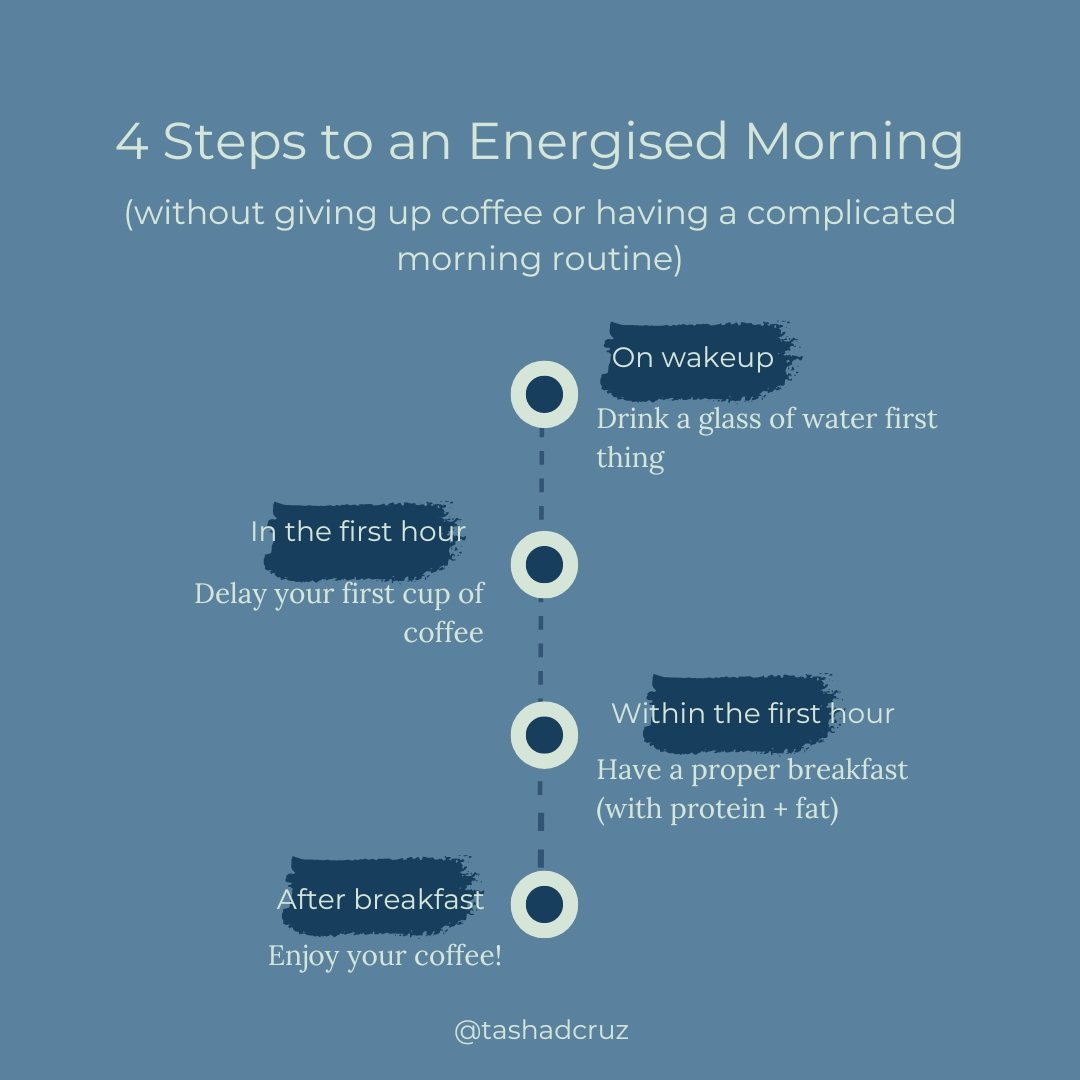How to Get Effortless Energy Within the First 2 Hours of your Day
This is why this is important: being exhausted and dragging your way through the first five years of motherhood is NOT inevitable.
Read on for the 4 steps to a calmer morning – without giving up coffee, having a complicated morning routine or setting the alarm unrealistically early.
Mornings are hard in motherhood.
You don't get to choose when you wake up, you don't get the chance to take it slowly (where's the snooze button on your 4-year-old?) , you certainly don't get to enjoy your hot drink while it's actually hot.
Before you know it you find yourself stuck in frantic, chaotic mornings that feel like a whirlwind.
You spend those first two hours snatching sips of coffee in between getting everyone's teeth brushed, clothes on, bottoms wiped, shouting at everyone to get out the door now or we'll be late! (Or if you're me 'We're already so late it's not worth going!').
Forget about sitting down to a proper breakfast - leftover toast crusts and cereal dregs as you pack the lunch boxes are the best you can do most days!
Never mind having a shower, doing your hair, putting make up on...!
But, what has changed is my response to that stress. And that started with putting my needs first. Not those nice-to-have, self-care type needs but basic needs like having a proper breakfast. Having a sit down. Getting a shower in. Properly enjoying my coffee.
Using the natural rhythms of the morning to fully wake up from the inside - hormonally, digestively and biologically.
Those first two hours in the morning are crucial for setting the tone of the whole day. It took me ages to realise that one of the biggest drivers in my exhaustion, overwhelm and frankly constant crappy mood was the way I started my mornings.
Because many mornings started with me shouting, leaving me feeling tense and grumpy, leading to guilt that I couldn't control my strong emotions better and be a better role model. Gentle parenting? I was doing it all wrong!
But there was no way I was going to be able to fit in a 2 hour miracle morning routine – morning yoga, journalling, exercise, green juices? Lovely, for those millenials with no children and time on their hands!
Definitely out of reach for those of us with pre-school children.
So it might be a while before you can have your dream morning routine. But I do strongly believe that you do matter. You do have the right to meet your basic needs. And you can do it in a way that fits into your busy life. Without neglecting your children's needs or creeping out of bed at 5am.
In fact, what I am going to offer are some tweaks you could make to what you're already doing.
1. Start the day with a glass of water.
You've probably heard how important staying well hydrated is. This is especially true first thing in the morning. Assuming you went to bed at 11pm and getting up at 6am, it's been a good few hours without drinking. So when you wake up your body is thirsty!
The problem is, the first thing most of us drink is coffee. And although this counts towards your liquid intake, its high caffeine content is diuretic, meaning it doesn't quench our thirst in quite the same way. I'll talk a little later about why starting with coffee on an empty stomach isn't a great idea anyway, but nothing can beat water to quench thirst.
Water is essential for many reasons:
It helps absorb certain vitamins
It provides shape and structure to cells
It regulates body temperature
It aids digestion
It facilitates nutrient and oxygen movement to the cells
.... and many others besides! As you can imagine, not getting enough water can show up in many ways - especially nutrient deficiency, low energy, constipation and cravings.
So making a glass of water the first thing you do in the morning is crucial to replenish what was lost during the night and getting a headstart on your water intake for the day. Have a bottle of water next to your bed so it's the first thing you see or have a glass next to the kettle to act as a reminder of the first thing you want to do when you get up.
2. Delay your first coffee of the day.
I know, I know. I feel the same. I love coffee - not just how it perks me up but the smell of it, the taste of it, the ritual of making it.
The thing is, when we wake up in the morning our cortisol level is high. Cortisol is usually called our 'stress' hormone - but it's actually a really important hormone when it's working in harmony with our body. In fact, it's high first thing in the morning because it's the hormone that wakes us up! (And is why when we are woken too early we feel groggy - because cortisol hasn't had a chance to kick in yet.) When working properly, cortisol peaks shortly after waking up - this is part of our natural rhythm, helping us to get going in the morning.
Caffeine spikes our stress hormones (cortisol and adrenaline) so you're adding another stressor to a potentially already stressful hormonal atmosphere, disrupting cortisol from doing what it's trying to do naturally.
Essentially you're adding a splash of fuel to the fire.
Delaying your first coffee gives your body time to catch up hormonally!
If you're doing point no. 1 then you'll start with a glass of water. If you feel you really need something more then try a cup of tea instead. Tea still has caffeine in but it's much lower than coffee, so will have less of an effect on the hormones.
3. Have your coffee after breakfast
Clearly putting your body into stress mode is not what you want when you're after a calmer morning. In addition, drinking coffee on an empty stomach can disrupt another hormone – insulin. This is the hormone that pushes glucose out of the blood stream and into storage, for energy later.
The increased cortisol released as a result of having caffeine can cause our body to think it needs to release that energy (because it thinks it's under attack!). But coffee can also confuse our digestive system because it's often quite high calorie with added milk and sugar. That means we feel full, even though we haven't actually eaten anything, masking the natural hunger we should feel first thing in the morning. As a result, we delay eating food even longer, allowing the coffee to fuel us instead.
This causes further confusion to our natural rhythms, driving the stress response - setting us up for an energy crash from low blood sugars (due to not eating breakfast) and a caffeine crash! Often this drives anxiety, makes us 'hangry' and causes us to make poorer food choices.
So when can you have your coffee?
After breakfast of course! Once you've put some food in your stomach, it will act as a buffer to how quickly your body responds to the caffeine and tempers the stress response.
4. Have a proper breakfast
Why is breakfast the only meal of the day we 'allow' ourselves to skip or eat much more sugar than we would for any other meal?
The food industry and cultural convention has normalised cereal and toast for breakfast. But stop for a minute and think about what your average bowl of cereal or toast looks like:
Beige (other than a splash of colour for jam?)
Lacking in vegetables
Takes less than 5 minutes to eat.
What if you were to eat that for lunch and dinner? Wouldn't you feel that you were lacking nutrients somewhere?
Sure, most cereal and bread is fortified with vitamins and minerals. But those nutrients would be there in the grains in the first place - they've just been stripped out in the processing! So it's the law to add them back in because governments know how dependent we are on these foods. And the versions of the nutrients that are added in tend to be lower quality and less easy for the body to process compared to what you'd get in un-processed, fresh food (you know, the kind you tend to eat for lunch and dinner!).
High-carb, low-nutrient breakfasts cause your energy levels to rise quickly, followed by an energy dip an hour or two later - hence the famous 11am slump!
Swap cereal and toast (especially the crusts and dregs... I see you food-waste-hating mum!) for a truly nourishing breakfast that keeps you going for longer. Make sure there's protein in there (eggs, yoghurt, nuts, seeds, meat) and fat (avocados, eggs, yoghurt, nuts, seeds - see a theme there?!).
Bring it all together
You might have got to the end of this and be thinking 'PAH! This is NOT going to even TOUCH the sides of my exhaustion!'.
I hear you. You might have been woken up multiple times in the night - maybe you have a baby who needs feeding back to sleep every 2 hours or a toddler with nightmares or a pre-schooler scared of the monsters. Or maybe you have all three. I'm right there with you.
The thing is, what do you have to lose? What would happen if you do make a few changes to your morning? What if you do swap your morning coffee for a glass of water? What if you do eat a breakfast that nourishes you instead of draining you?
Maybe, just maybe, you'll notice that making a few adjustments that centres on you and your needs will make you feel...better. Better about yourself, better about being a mother, better about the day ahead.
And maybe... a little more energised.



